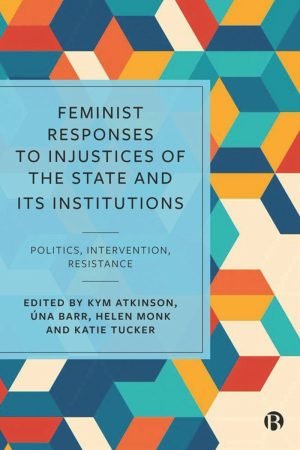articles
China Elevator Stories
Feminist Responses to Injustices of the State and its Institutions: Politics, Intervention, Resistance (by Kym Atkinson, Úna Barr, Helen Monk and Katie Tucker)
We know there’s something wrong with institutions when women don’t receive the help they need.
03/10/2024

Ruth Silbermayr
Author

Institutions, including the police and the courts in Austria, support misogyny. When you go to the police to make a report, the police officers may remind you that what happened to you doesn’t necessarily mirror a crime, or that it’s not worth reporting, or that you’re simply imagining your ex-husband is a violent person when he isn’t.
What if they do this to keep the number of reported crimes as low as possible, leading to an officially low number of reported crimes and creating the appearance that crime rates are lower than they actually are?
The book Feminist Responses to Injustices of the State and its Institutions: Politics, Intervention, Resistance by Kym Atkinson, Úna Barr, Helen Monk, and Katie Tucker described a text published over 40 years ago called Violence Against Wives: A Case Against the Patriarchy:
“The text concluded by warning that unless the legal, political, economic and family structures which pervade every aspect of cultural life were challenged and disassembled, the systemic subordination of women and the endemic nature of violent practices against them would continue.
In 2022, all of these arguments remain depressingly familiar. While there are many causes for celebration with regard to feminist gains made over the last 40 years, these are neither secure not protected. Rampant, toxic masculinity and violent, structural power relations such as ‘race’, ethnicity, nationality, sexuality, faith, socio-economic status and disability, bind together enduring and remorseless acts of violence against women and children, perpetrated at individual, institutional and state levels. (…)
However, we appear to be at a critical juncture in relation to the ongoing disruption of accepted academic narrative, popular common sense and political complacency around particular gendered social issues. In breaking the silence around sexual harassment and abuse, various disclosures and different campaigns have sought to frame men’s violence as an issue that is pervasive, overlooked and ignored.”
While this book talks about what is going on in the UK, similar tendencies can be observed in Austria.
In the book, the authors confirm that institutions don’t deal correctly with victims, and crimes that could have been prevented aren’t. In the UK, between 2009 and 2018, one woman was killed every three days on average. These numbers are similar to the numbers in Central European countries.
The authors write:
“Why, given the ostensible increase in economic, social and personal freedoms for women, investment from successive governments through a plethora of initiatives, consistent and vehement campaigning from activities, survivors and the academy, and claims by the police, and other state institutions, that they have changed, has men’s violence against women continued to be exercised fatally at such an alarming and devastating rate? (…)
The state’s role in gendered relations has been theorized from different perspectives and, irrespective of the feminist position taken, and the ways in which its varied institutional sites are understood, the state remains a relevant site of analysis for theorizing gender relations and the often-violent maintenance of a hierarchical, gendered social order. A particularly useful analysis, for us, comes from Connell (1994), who outlined a framework for analysing the interplay of existing power relations in which gender relations are understood as inseparable from the state and its institutions.”
If a large number of men in a society are abusive, we also have to assume that men in positions of power would be. The abuse you originally experienced in your marriage or in other relationships will simply be exacerbated by others you meet, such as aggressive male police officers, when you seek help.
Even though on the surface it may seem that such institutions are supposed to help victims, in reality, many times they don’t. A good example of this is when I tried to report my ex-husband to the Austrian police six times, but was only able to file a report once.
Have you ever encountered institutions that protected perpetrators?